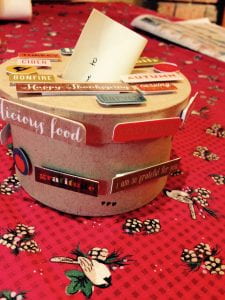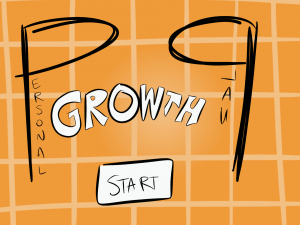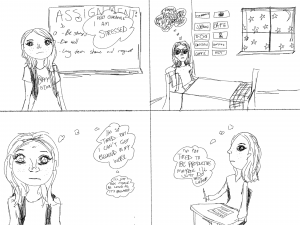Hello, Internet.
Also, hello those of you here in person. Welcome to another Transitional Presentation of Learning.
While I don’t want to make this too similar to my last blog post, I do want to call upon my time machine project as a reflection of what I’ve learned this year, and what I want to focus on learning next year. I also want to take a look at the goals I set for myself in my MPoL to see if I’ve achieved them.
The main goal that I set in my MPoL was to push myself in terms of using different media or techniques in my work. I think a good example of a place that I did this was the reflections we did while reading The Seven Habits of Highly Effective People. A few of my reflections included creating a “piggy bank” representing how much I was being productive and making good decisions, and creating a crossword puzzle themed around the chapter of the book we had just read.
I definitely had to make a conscious effort to use these formats for my work, rather than falling back on something like writing that would have come more easily to me. Even though making a crossword isn’t necessarily something I would often do for a project, I enjoyed the challenge of trying different things and expanding my lexicon of abilities. In the case of the reflections, putting more work into something and stepping outside of my comfort zone forced me to do more actual reflecting than I would have had to do for something I was really comfortable with.
I should also touch on the work from this year that I think I could have improved. We did an entire unit on writing, which as I’ve mentioned before, is well within my comfort zone– but for something I’m usually good at, I think some of the work I did was kind of mediocre.
(Thank you Parker for this visual)
One issue may have been that I have trouble getting myself invested in work about subjects that don’t personally interest me. While I really enjoyed learning about the red scare and general fifties culture, and the Civil Rights movement, I wasn’t as entranced by the topics of the Cold War and our current subject, the Vietnam War, and I think that was reflected in my work. While I am excited about the subjects I know we’re studying next year– horror and modern history are both definite interests of mine– I also think that it’s important to be able to care about a project without caring about the subject matter.
Now, I just did a whole project reflecting on what I have and haven’t improved on this year: the time machine project, in which I created an artifact that I would have liked to have sent myself at the beginning of PGP.
The thing I think I have improved this year is procrastinating less. This has been a long term goal of mine but, unsurprisingly, I’ve never quite gotten around to achieving it. We did a whole unit on time management, and although I don’t actively use everything from that unit, I do think it helped me become better at managing my own time.
What I want to talk more about, however, is the other thing I focused on in my time machine project: the thing we looked at that I still need to improve. In The Seven Habits of Highly Effective People it’s referred to as sharpening the saw, but the more general term is just taking care of yourself.
To draw again from the book, “sharpening the saw” referred to keeping yourself healthy in four aspects: social, physical, mental, and spiritual. In the drawing above, you can see the typical level of each that I would display. Physically, I care about my health a fair amount– I’m constantly dehydrated and my diet leaves something to be desired, but I regularly exercise, get rest, eat carbs, and take care of my hygiene, and as a result I stay pretty healthy. Mentally, at least in terms of cognitive function, I always want to engage my brain and keep learning– I spend time doing things like crosswords that are a fun mental challenge, or reading the news to help stay up to date with the world around me, and it’s important to me to try and educate myself (as well as, of course, get an education in school) and be capable of comprehending and critically considering big ideas.
On the other hand, my social and “spiritual” health are on the lower side. I’m very introverted, so it doesn’t take a lot for me to feel socially drained, and although I enjoy spending time with my friends and family, being around people for too long can make me moody or exhausted, and I find it difficult to judge beforehand just how a social activity is going to affect me. I’m not a big fan of the word spiritual here, because I think of it as mostly having vague religious connotations, whereas I think the idea of “spiritual health” is actually referring more to emotional health. Like everyone, my emotional health varies, but I definitely don’t take care of it as consistently or as well as I take care of my physical and cognitive health. I have a habit of letting myself get burnt out– and then trying to push through it, rather than addressing the issue. Usually around this time of year, I’ll get anxious and stressed about school, which messes with my appetite and ability to sleep, and leads to me being sick or exhausted. When I do this, my work gets sloppier, and I find it increasingly difficult to be productive.
Recently, my physical health suffered a little bit when I came down with mononucleosis. As with emotional burnout, I typically try and push through being sick while disrupting my life as little as possible. Particularly at this time of year, I dislike missing school or work, as well as the more fun things I do in my free time. Around the second day I was sick, I went boxing with my sister, figuring I just had a cold and could mostly ignore it. Before we drove home afterwards, she asked me whether it was safe to start the car, because I looked I was about to faint, and she didn’t want to be driving if I suddenly passed out.
That and the fact that I pretty much did feel ready to pass out was enough to convince me to stay home from school the next day, but I was determined to get back on my feet as soon as possible; I went to work that night, and the next day I was back at school.
This is a picture of me with mono, outside, hanging out with friends, and generally trying to ignore how sick I felt.
That weekend I was still feeling sick, so my mum suggested going to the clinic in case it was strep throat. I figured it wouldn’t hurt, although I was still pretty convinced that it was a cold, so we went and talked to a doctor who told me that I had either strep or mono, I should get tested for both, and I should stay out of school for the next few days. The next day, I got blood drawn and tested for mono, with positive results.
Much to my chagrin, there is no treatment for mono, and I spent the next week essentially bedridden. For about five days I did little more than sleep, eat popsicles, and watch TV.
However, that was pretty much all it took. Mono is known for lasting a long time, but once I actually stayed home and got rest and took care of myself, I got over most of my symptoms in close to the minimum of time mono takes to run its course. By the following week, I was back on my feet, and despite it being a crucial time of year, I was able to pick up where I left off with school without too much trouble.
What I want to take away from this experience is that taking time to recuperate and coming back fully charged is ultimately better than trying to ignore unhealthiness– and this goes for everything, not just physical health.
While I would like to avoid wherever possible things like missing a week of school, on a smaller scale I think it would improve my ability to do work well to try and avoid getting burnt out. Not procrastinating and having good time management is an important skill for this one. Doing things early rather than letting them pile up or leaving them to the last minute will help decrease the amount of stress I’m feeling. Being able to time block both time to be productive and time to rest can help me find a balance. Another thing that will help is being proactive– assessing a situation ahead of time and making a call that if I go out with friends the day before I do a big test, I’m not going to be able to do as well as if I get some rest so I have the energy to be productive the next day (this is assuming that in both scenarios I’ve studied and prepared).
While I think learning to sharpen the saw is important and will really help with my productivity and the quality of my work, and it is something we discussed in PGP, I realize this isn’t strictly an academic goal. However, for me, feeling stressed or overworked emotionally or physically is consistently school related, and school is one of the most important things it affects, so when I was setting this goal I was largely considering how it would play into my academic life. I think it’s somewhere between a personal and academic goal, but with an academic focus.
So, on the more academic side, my goal for next year is to focus on finding a way to get invested in my work regardless of how much I care about the subject matter. On the somewhat less academic, but more personally important, side, my goal is to be proactive and manage my time in a way that allows me to take care of myself in all aspects so I can be as productive as possible.
Toodles.









